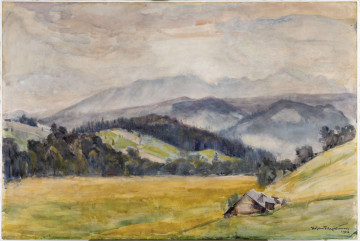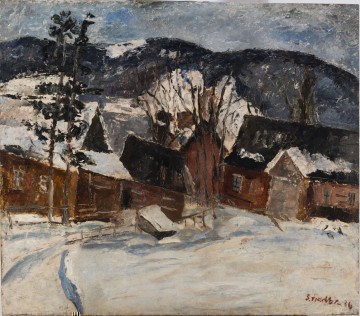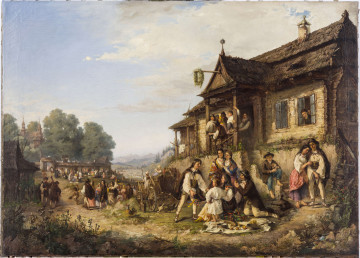
Mountainscape
1992 — 1922
National Museum in Lublin
Part of the collection: Polish landscape painting (19th–1st half of the 20th c.)
Michał Rouba was born in Vilnius into a family with patriotic traditions. His father was a researcher of Adam Mickiewicz's legacy, a journalist and a regionalist. He maintained contact with important figures of science and art. His son's early artistic attempts were appreciated by Mikołaj Čiurlionis and Ferdynand Ruszczyc. He developed his natural talent at the Academy of Fine Arts in Krakow and Stefan Batory University. The artist remained faithful to his birthplace, Vilnius, where he worked until he died in 1941. In the interwar period, he participated in numerous artistic ventures. With Ludomir Śleńdziński he founded the Vilnius Society of Artists, a group promoting the so-called New Classicism. He led this group in the 1930s and taught drawing in Vilnius schools. He exhibited regularly in the country and abroad, winning many awards.
Rouba's painting is an original phenomenon on Polish art, although it is limited to landscapes, consistent thematically and stylistically. The quintessence of his work is a series of about twenty views of Vilnius and its surroundings from 1929-1933, including Pejzaż wileński [Vilnius Landscape]. The cycle presents an unusual image of the city consisting of poor districts, old backstreets, modest houses, shops and sad backyards. On the artist's canvases they turn into an unreal, dreamy reality. Deserted fragments of the city, where people rarely appear, predominate. The city and its inhabitants seem to be suspended in time and space, shown in simplified, clear forms. The painter wanted to save his beloved world from oblivion in the age of industrial changes. Vilnius in Rouba's paintings becomes a romantic, fairy-tale land reminiscent of the world seen through the eyes of a child. The painter created this image using a well-thought-out composition, a synthesis of representational elements consistently deprived of details, and a specific colour scheme. In Pejzaż wileński, it is almost monochromatic. Portrayed in transparent browns and greys, the picturesque suburbs of Vilnius with a lonely wooden house on a hillock, with half withered pines watching over it, and a bend in the Neris river below, evoke a mood of nostalgia, saturated with a disturbing reflection that this world has indeed passed away.
Bożena Kasperowicz
Author / creator
Dimensions
cały obiekt: height: 44,5 cm, width: 35,5 cm
Object type
painting
Technique
oil technique
Material
chipboard, oil-based paint
Creation time / dating
Creation / finding place
Owner
The National Museum in Lublin
Identification number
Location / status

1992 — 1922
National Museum in Lublin

1936
National Museum in Lublin

1870
National Museum in Lublin
DISCOVER this TOPIC
Castle Museum in Łańcut
DISCOVER this PATH
Educational path